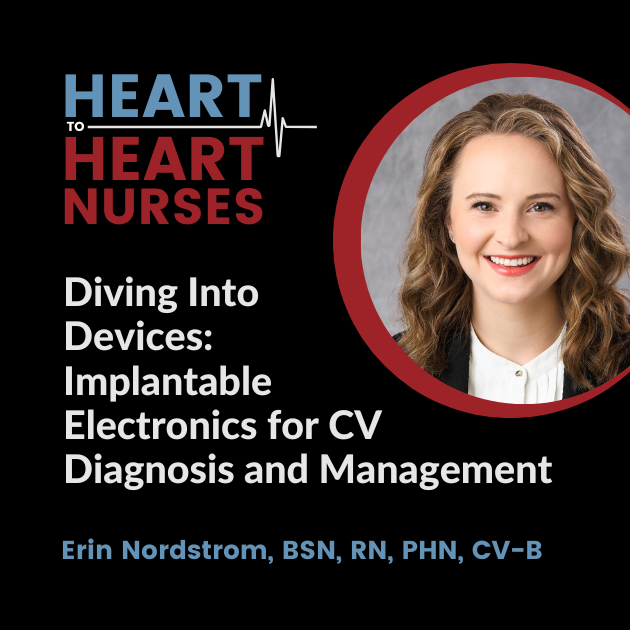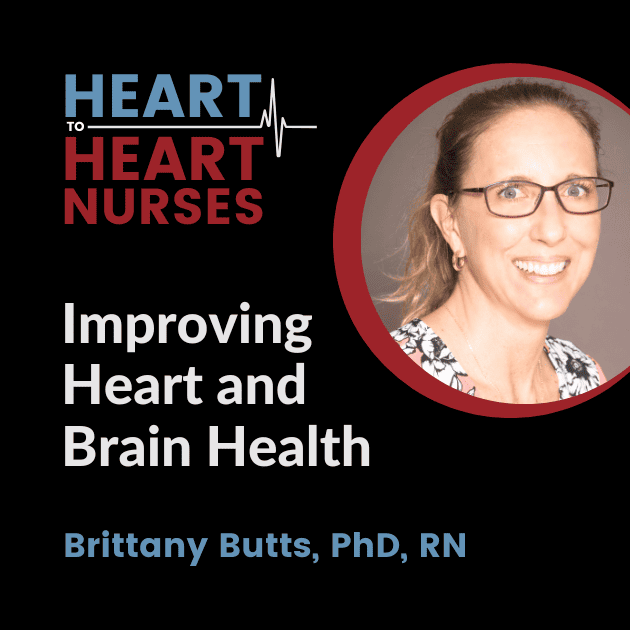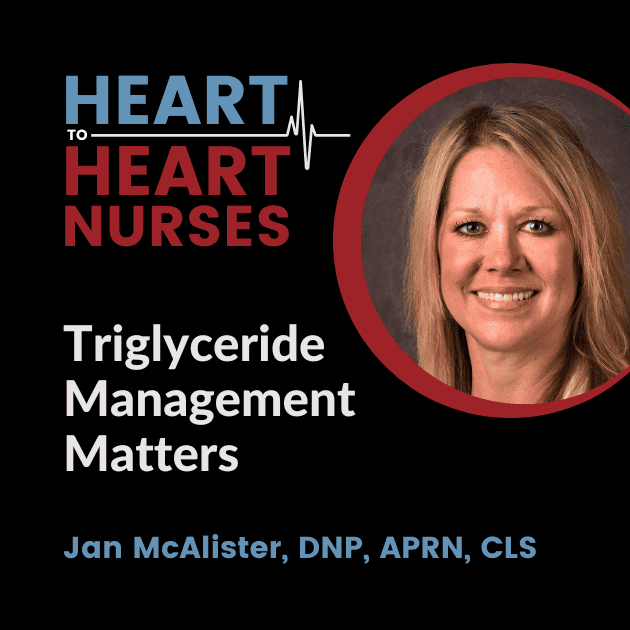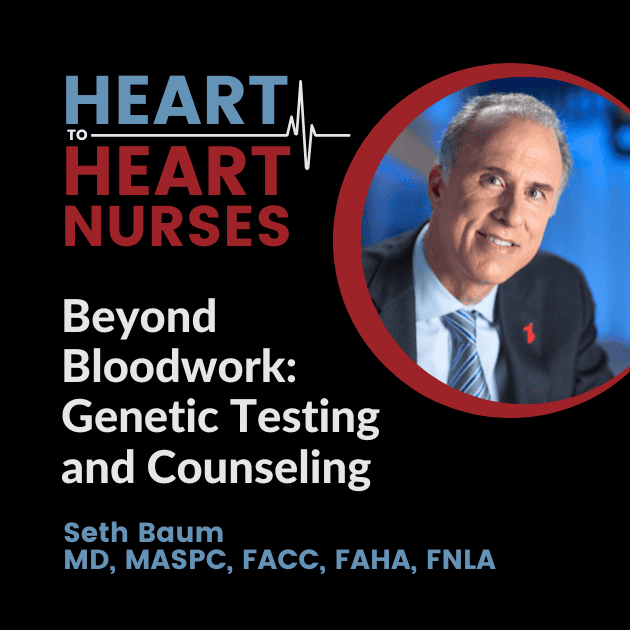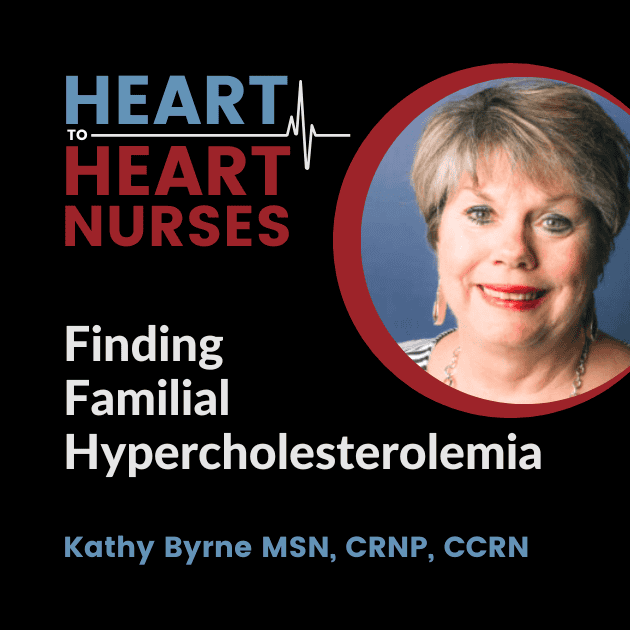Episode Resources
Welcome to Heart to Heart Nurses, brought to you by the Preventive Cardiovascular Nurses Association. PCNA's mission is to promote nurses as leaders in cardiovascular disease prevention and management.
Geralyn Warfield (host): Welcome to today's episode, and we have the great pleasure of having Jan McAllister with us. Jan, could you introduce yourself to our audience please?
Jan McAlister (guest): Well, thanks. I appreciate you having me. My name is Jan McAlister. I am a DNP nurse practitioner in Atlanta, Georgia at Piedmont Heart Institute. I run the lipid clinic there; I'm a clinical lipid specialist.
Geralyn Warfield (host): Well, right before we came on air, you were telling me about the evolution of triglycerides, particularly in your career, and I thought it was a very compelling story. Would you be willing to share that with our audience?
Jan McAlister (guest): Oh, most definitely. So back in the day, [00:01:00] my first nursing job in 1991 as a registered nurse, inpatient, they had actually checked a lipid profile on a patient and the triglycerides were over three to 400. And I went to the cardiologist because I was on the cardiac floor and said, “What are we going to do about these triglycerides?”
And he goes, “Oh, we don't worry about that. They're not that important.”
And so there was a big debate for years. Are triglycerides atherogenic? is this a cardiac risk factor or is it just LDL? People would go back and forth, back and forth. 2018 ACC/AHA guidelines came out and they included triglycerides as a risk enhancer. But not a true subject of [00:02:00] treatment.
And now we have the 2021 ACC consensus statement that has a whole algorithm with four different patient groups to treat triglycerides.
Geralyn Warfield (host): So why do you suppose it is that triglycerides are not part of what a patient's thinking about when they come to a clinic visit, when they get their labs? You know, it seems to be not something that they have heard before, maybe even.
Jan McAlister (guest): It's not on their priority list because we have spent years ingraining LDL, LDL, LDL. We have targets for LDL. We have numbers for LDL. Doctors, primary care cardiologists are saying this is where we want your LDL.
A lot of patients for a while did concentrate on HDL, because we had medications out there for that, which didn't really pan out. So that's kind of gone by the wayside. [00:03:00]
But I do find that when you start talking to patients about their triglycerides and what causes high triglycerides in the bloodstream, they don't want to hear it. They don't want to recognize it. Because a lot of it is dietary-induced and not necessarily something else that a quick pill would fix.
Geralyn Warfield (host): And so, can you talk a little bit more about those secondary causes of hypertriglyceridemia?
Jan McAlister (guest): So, probably the number one secondary cause of hypertriglyceridemia is uncontrolled diabetes. Diabetes is a sugar diagnosis, and so triglycerides are elevated with sugars, carbohydrates, and saturated fats.
So, if you have an uncontrolled [00:04:00] diabetic, and they come to you and they have triglycerides of 300, 400, 500, and they have a hemoglobin A1C of 12.3, I don't care what you do, you cannot control those triglycerides until the diabetes is controlled first.
Same thing is true with thyroid. You have to look at underlying causes. Make sure they’re euthyroid, and that that is not part of the problem creating the issue of the triglycerides.
Many people don't realize in cardiology what are some of our drugs that we use a lot for blood pressure—beta blockers, and thiazide diuretics—and that these can increase triglycerides. So, some of it is drug-induced. I recently had a 20-some-odd year-old patient come to see me [00:05:00] who was recently on Accutane. And that will dramatically increase LDL and triglycerides.
So, it's important to include the patient in the conversation and discuss what may be another cause, and lead into if you can't find a secondary cause, how do we make things better? And then do a complete review of their diet.
Geralyn Warfield (host): We are in conversation about very high triglycerides, and we're going to take a quick break and be right back.
Geralyn Warfield (host): We're back with our conversation with Jan McAlister, and let's pivot just a little bit to treatments. I heard you talk a little bit about some of the potential causes of this, but how do we go about treating it?
Jan McAlister (guest): Well, if you look at the 2021 ACC consensus guidelines, they have a clear pathway for four different patient types and where their [00:06:00] triglycerides are, and where their LDL is. Because we still know that LDL is very atherogenic and for those individuals, high risk with ASCVD or intervention, their LDL still needs to be treated. So, there is a way to get the best of both worlds; we don't have to sacrifice one for the other.
So, you're still looking at the LDL, but in order to treat the triglycerides, which we do know is a cardiovascular risk factor and does attribute to cardiovascular disease, the guidelines say the first therapy for the patient is diet.
And that can involve a dietician. First you have to do a complete review of what they're currently eating. [00:07:00] But if you have patients who are morbidly obese, they are more likely going to have higher triglycerides than those individuals that have a relatively normal BMI.
And the diets that are higher in carbohydrates, higher in simple sugars, higher in saturated fat, higher in alcohol, those are going to raise the triglycerides more than individuals who are eating their lean proteins and their vegetables.
Geralyn Warfield (host): So, beyond that really important diet aspect, you had mentioned before the break about how some of the high triglyceride values that some of the patients are facing is because of some of the drugs that they are taking. So, you mentioned beta blockers and even Accutane and things like that. Is there ever a shared decision-making conversation about that, or would [00:08:00] there be any benefit at all to changing the medication dosing? I'm just curious. I don't even know.
Jan McAlister (guest): 100%. It is shared decision making to all team members who are part of the patient's care team. Certainly, if changing to another high blood pressure medicine is certainly very easy to fix.
Controlling the diabetes. It is amazing what happens when you take a hemoglobin A1C from over 10 down to seven. How the body habitus changes, how the triglycerides—the entire lipid panel—will change, the HDL will come up. So, most definitely treating the underlying causes, changing medications if you are able to, are going to help the cause. But inevitably, if we're put the wrong gas in the [00:09:00] engine, the engine isn't going to run efficiently.
Geralyn Warfield (host): I so appreciate that. So that high quality fuel, in terms of lean proteins, lots of plant material, fewer donuts, sugar sweetened beverages,,,
Jan McAlister (guest): Fast food.
Geralyn Warfield (host): There you go. Really makes a difference. And it would impact not just the triglycerides, but other parts. And so, you'll be healthier overall, less inflammatory markers. You have just sung the praises of a heart healthy diet, have you not?
Jan McAlister (guest): I have and unfortunately…in the US obviously we have multiple cultures all involved in our wonderful United States. And many different cultures have just ingrained as a part of their heritage higher carbohydrates, higher processed [00:10:00] foods.
Also, our lower socioeconomic status. It is more expensive to eat a healthier diet than it is to go to a fast-food restaurant and get the 99-cent meal. So cost is a big issue as to why patients don't follow the healthier diet.
Geralyn Warfield (host): And I would say another one is food deserts or quality food deserts. That maybe the only food source in the neighborhood is a convenience store that doesn't carry fresh fruits and vegetables. Maybe there's not a farmer's market or a delivery service that brings quality vegetables to the area. So, it can be quite a challenge.
And I know that some communities and some healthcare professionals have the ability to do a produce prescription where they partner with local farmer's markets or other organizations to make those fresh fruits and vegetables more accessible and more affordable.
So that's one way to potentially meet the [00:11:00] challenge, but that definitely takes a community-wide effort.
Jan McAlister (guest): 100%. I know a lot of growers do that as well. Come into communities and you can order directly from a grower, and they come in, it's all in their trunk, and you purchase it—once again, if you can afford it.
Geralyn Warfield (host): Right. Is there anything else that you would like our audience to know that we've neglected to discuss already?
Jan McAlister (guest): No. I would reiterate that triglycerides are atherogenic. And it's not really the triglyceride itself, it's the remnant particles that you get from the triglycerides. Triglycerides are not atherogenic, but the remnant particles that are produced from it are, and can get into the intimal of the artery, and that's where they start to form plaque.
So, the more we can do, the better off we are.
Geralyn Warfield (host): Thank you so very much, Jan McAlister for being with [00:12:00] us today and sharing all of that exceptional information. I know that Jan is going to encourage us to lead by example and eat healthy ourselves as best we can so that we can model that for our patients.
Thank you again for being here. This is Geralyn Warfield, your host, and we will see you next time.
Jan McAlister (guest): Thank you.
Thank you for listening to Heart to Heart Nurses. We invite you to visit pcna.net for clinical resources, continuing education, and much more.
Subscribe Today
Don't miss an episode! Listen to the Heart to Heart Nurses podcast on your favorite podcast listening service.







